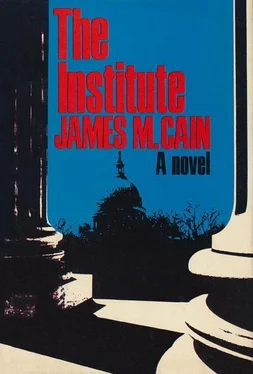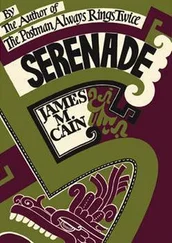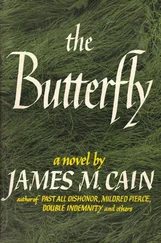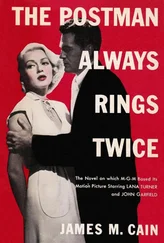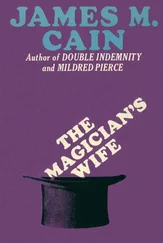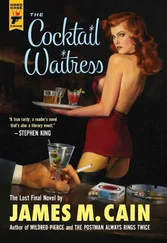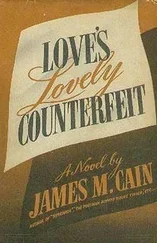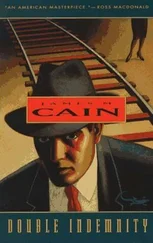“I just love that little brick privy,” murmured Hortense with stars in her eyes — “its walls all covered with ivy—”
“You go wash your mouth out with soap,” Mr. Garrett snapped.
“I’m showing appreciation!”
He tried to reprove her some more but had to laugh in spite of himself. We all had to laugh.
Mr. Garrett went on: “The funny part of it was that I knew nothing about it until Lloyd Palmer called. Holton had sent me a memo, but I didn’t take time to read it until Miss Immelman brought me the file we had on Bagastex. There it was on top — and I got busy quick. So... once more we have Lloyd Palmer to thank. Let’s drink to him.”
By then more margaritas had been ordered. They all picked theirs up, and I picked mine up before I remembered that I shouldn’t drink. By now I thought it was impossible to feel any crummier, in spite of the laughing I’d done. But with those three glasses raised in my honor, I managed it. Garrett looked at his watch and then asked Sam if he was all squared away for tomorrow.
“I am,” Dent said, “if Mrs. G. likes the building and you’ve come to a final decision that you want the deal to go through.”
“I love it,” Hortense said.
“Then it’s all yours, Sam. See that O’Connor is paid, and for God’s sake, check all the stock that Lucas turns in for those subsidiary companies. I don’t say he’d forge duplicates—”
“ I do.”
“Let’s both say it, then.”
“Mr. Garrett, it’s all under control.”
“O.K., take it away.”
Mr. Garrett looked at his watch, motioned to the waitress for the check, then got up and followed her to the desk to pay it. When he came back, Sam asked him: “You’ll be here tomorrow?”
“I hadn’t expected to be. I have to be getting back. If something comes up, call me and—”
“You’re going back tonight?” Hortense asked, surprised.
“It’s not too late. I’ll have the road to myself.”
“Well, don’t wake me by calling me up.”
“Do I ever? How did you get here, by the way?”
“Taxi.”
“Lloyd, would you see her home?”
“Be only too glad, of course.”
Mr. Garrett had left his car in the ARMALCO garage. As soon as we were out on the street, he flagged a cab to take him there. He kissed Hortense, got in, and drove off. Same Dent flagged a cab, kissed her, and drove off. By then, I had told her where I was parked, but without saying a word, we knew we weren’t calling a cab. We swung hands and started walking down Seventeenth Street by the light of the moon, carefree, goofy, and happy just from knowing we would be together that night. We hardly said anything driving out or in the apartment, hanging her coat up, or having our first kiss of the evening.
She insisted on scrambling some eggs, “because you didn’t have much to eat, and I love cooking for you.” So we ate her little supper, went to bed, and for awhile were close. Then, stretched out on top of me, she whispered: “Did you hear what he said? ‘Lloyd, will you see her home?’ This is my home.”
“Well, except for the wall decorations, it—”
“The stomach, not the apartment!”
“Oh. Then, it has a beautiful tenant.”
“Tenant?”
“Well — mate.”
“Wife, I think you mean.”
“I wish I did, but I don’t. You have a husband already.”
“You’re the only husband I have or ever expect to have.”
“I tell it like it is.”
She rolled off me, and I said: “However, I love you.”
“Then act like it.”
I acted like it, and after some time, she was topside again, kissing my neck.
In Wilmington, Washington, and various places, things now began to accelerate. Next in our order of business was the application we had made to I. R. S. for a tax-exempt status. To sit in with us on that, Sam brought in a tax lawyer, a character named Kaufman, who was a bit of a stuffed shirt, but was a shark on tax law, which was what we hired him for. Around Sam’s age, he was grossly overweight. Kaufman insisted that we work in his office on Sixteenth and C because his reference books were there, so I would walk there every day from the Garrett Building on Massachusetts. The reason I had to sit in was that I knew what the Institute would be doing. So day after day, for the supplemental booklet we would submit, I dictated to Kaufman’s secretary a detailed account of our projected activities, so every possible thing would be covered and we wouldn’t hit any snags later just by failing to include some material in our application — “to acquire, repair, and shelve books, pamphlets, periodicals, manuscripts, and source material of all kinds”; “to employ researchers, technicians, scholars, consultants, and librarians for the assistance of scholars writing biography or writing anything which, in the judgment of the director, contributes to biographical study”; “to employ persons qualified to prepare indices for the assistance of scholars writing biography”; “to acquire, operate, and maintain recorders and employ technicians to maintain them, such recorders to use film, tape, wax, wire, or other means of reproduction, oral or visual or both, for the preservation of biographical material” — and so on for eighty-five pages in blue cover, until my tongue had kinks in it from dictating such gobbledygook. But Kaufman seemed satisfied, and it was Garrett who called at nine-thirty one morning while Hortense was still in bed to tell me: “Lloyd, I’ve just opened my mail and wanted you to be the first one to know. We have our ruling.”
“We have our—”
“Ruling. From I.R.S. We’re in.”
“Well, hey, that’s wonderful news. I’d heard they were fairly prompt but didn’t expect action so soon. It’s hardly been a week.”
“Our application’s in order and on the up and up, that’s why. Kaufman gives you full credit — while, of course, saving some for himself.”
“He did fine. Well, I’m pleased.”
That put him up tight and me up tight — him because by now rumors were going around, with stuff coming out in the papers, and he had to make some kind of announcement, and me because I was named in the rumors and the university kept calling me, especially the president’s office, to know what was going on and whether I would be there next year, as so far I hadn’t resigned, not being quite sure how things would finally turn out. So I had to make up my mind, and did. In a short, hand-written note, I resigned. Mr. Garrett had also made up his mind. He asked me to come up to discuss his press statement. So next morning I was in his Wilmington office, listening to his idea on how to make the announcement. It was weird, to say the least but at the same time, interesting, because it showed how little a big wheel understands public relations or what he owes the public in the way of information. He thought it was enough to send out a brochure, one I would write, “of two thousand words or so,” describing the Institute, along with an engraved announcement, “and that’s all. I’ve checked off the newspapers here that I think the brochure should go to.”
He had his thumb marking a place in a book, which he passed to me. It was Ayer’s newspaper directory. He had put markers in for Boston, New York, Philadelphia, Baltimore, Washington, Norfolk, Richmond, and a few more places, with check marks beside the big papers in each city, which you couldn’t overlook, of course, as the circulation figures told you. I glanced at it here and there, and while I did this, he went on: “I may say that, since this is in my wife’s honor, for once in her life, I don’t want her besmirched — by printer’s ink, I mean — as she has been in Wilmington. After all, it’s a private matter, and when we’ve come up with all legitimate information. I think we should cut it off. I think we’re entitled to cut it off.”
Читать дальше
